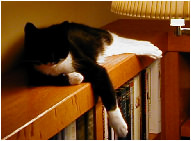January 31, 2008
"A world at peace they could scarcely remember"
C Northcote Parkinson performed the unusual feat of writing a biography of a fictional character, The Life and Times of Horatio Hornblower: A Biography of C. S. Forester's Famous Naval Hero. It's not a good as the Hornblower books themselves, but it's not bad. Anyway, I happened to pick up my copy recently, and noticed this passage...
...To understand Hornblower's proposal [using explosive shells against wooden ships] and Cornwallis's reaction we have to remember that the senior officers of 1793-1815 had all been trained in the War of American Independence; a war fought between gentlemen on either side. Admiral Rodney had been living in France when war began. Howe had thought it enough to defeat the French, if he could; he did not talk of destroying them. Even Pellew had a great friend among his opponents. He and others retained some sense of chivalry. Thus, a ship-of-the-line in battle never fired at an enemy frigate unless she fired first. The game was played according to the rules; rules which might be broken but which were still held to exist. The French Revolution brought about an abrupt change of atmosphere, there being few gentlemen left on the French side. Some idea of fair play lingered even then but Napoleon lowered the tone still more, aiming now at his enemy's destruction. Some senior officers of the Royal Navy became almost as ruthless, Nelson being the chief of these.
After them, however, came younger men, and Hornblower among them, who had been trained in this particular war. Theirs was a war against the first of the modern dictators. Of the older and more chivalrous warfare they knew nothing. A world at peace they could scarcely remember, having seen it only from the classroom. Among them, moreover, were some, like Cochrane, who had been influenced by the industrial revolution....
This is accurate history, and is similar to what has happened in other wars. The American Civil War is a good example. And thinking about this gives me a certain feeling of optimism about our long-term prospects in the Global War on Jihadism.
We are in this war, and are now hobbled in fighting it, because of a variety of stupid leftist and fake-pacifist and "realist" ideas . Such as that jihadism is no big deal as long as they are just killing Jews. Or that the arhabis have legitimate grievances that can be appeased or placated.
But it seems to me likely that the young officers and troops now serving around the globe are going to be a lot more clear-sighted about things. And they are the leaders of the future. They will be much more willing to take the gloves off and destroy the enemy.
Oh, and by the way, by "destroy the enemy" I do not primarily mean by slaughter and mayhem, although those will be necessary (and merciful and Christian) at the proper times. Much more I mean the sort of thing we are doing right now in IRAQ, fostering democracy, economic freedom, and globalization, in alliance with the local population. These are weapons of the war. And their value is clearly demonstrated by how much our enemies HATE them. Jihadis, tyrants, fake-liberals, fake-pacifists, and nihilists of every stripe, are UNITED in their hatred for the possibility of Iraqis and Afghans, and other oppressed peoples becoming free and prosperous allies of the United States. That alone is enough to tell me that we are on the right course, and to say, "Thank you President Bush, for doing the right things."
Posted by John Weidner at January 31, 2008 10:01 AM


